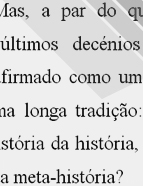

................................
Quite different from Magalhães Godinho's perspective was the analysis advanced by Fidelino de Figueiredo in 1954. A literary historian and essayist, a professor at the University of São Paulo at the time, and the author of studies on Portuguese literature that offered alternatives to those of Teófilo Braga (marked by heterodox positivism), Figueiredo valued the formative role of philosophy in its relationship with historical writing. To a certain extent, he distanced himself from the agenda of immediate political battles, whether in favour of or against the Republic. However, he emphasised the inevitability of the connection between politics and history: “All politics are either faithfully historicist or ambitiously anti-historical” (Historiografia portuguesa do século XX, pp. 338–339). While still in Portugal, as secretary of the Portuguese Society for Historical Studies, Figueiredo expressed a traditionalist intent in his activities. He succeeded in bringing together a highly heterogeneous group of historians around that association and the aforementioned Revista de História. This group shared a desire to renew the historical spirit, converging erudition, history-as-science, and art history, alongside an openness to external influences and a commitment to cultural roots—trends that were already emerging among the Portuguese cultural elites.
During that period, the establishment of two new universities in Portugal (Lisbon and Porto) and the 1911 reform, which linked History and Geography, stimulated reflection on the role of history in society and education. They also highlighted the importance of studying national identity through a historical lens (but in Porto, the Faculty of Arts would not be established until 1919, and, after its closure in 1928, would only reappear in 1962). Fidelino de Figueiredo established connections with foreign historians such as Benedetto Croce, Edgar Prestage, and Bustamante. However, significant developments would have to wait until the post-World War II era. Portugal's peripheral situation did not facilitate exchanges with the European cultures where historiographical vanguards were having the greatest impact. Despite political constraints, the Junta de Educação Nacional l [National Education Board]- later the Institute for High Culture—played an important role in supporting some research fellows in European universities, also in the field of human sciences .
